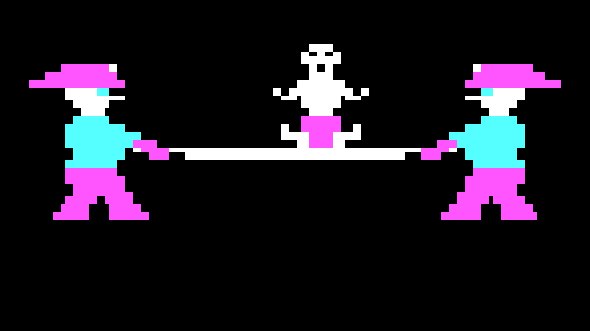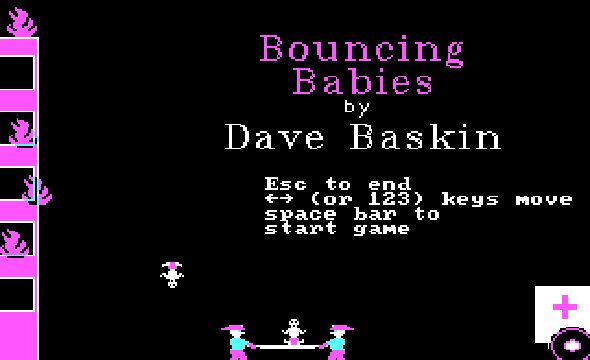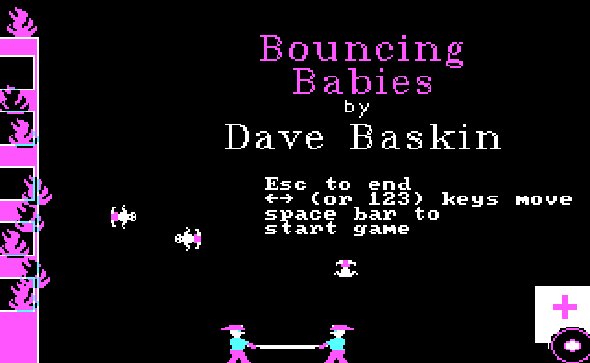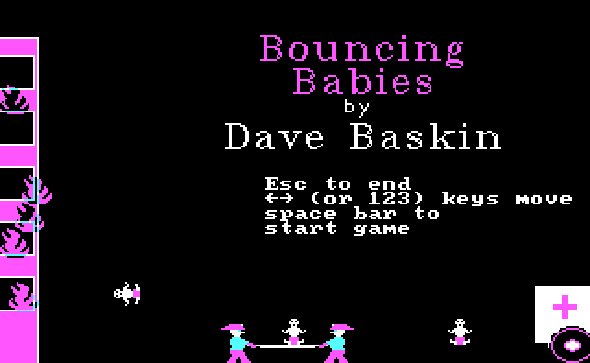Crapshoot: Bouncing Babies, the game of reckless infant slaughter
We're rerunning Richard Cobbett's classic Crapshoot column, in which he rolled the dice and took a chance on obscure games—both good and bad.

From 2010 to 2014 Richard Cobbett wrote Crapshoot, a column about bringing random obscure games back into the light.
Can games be art? Oddly, no matter how many hundreds upon thousands of times the question is asked, nobody ever seems to have an answer. You'd think it would be simple. Yes, they might say. Or no. Maybe something in the middle, served up in the most faux-intellectual, self-aggrandising, tiresomely sesquipedilian way possible. Who can say? Nobody. Or can they? Yes. For, lost in the depths of time, there is one game and one game alone that dared to let action speak louder than words. Even really loud ones like BANG! This classic's name? Please. It is already burned into your soul.

Bouncing Babies is more than a game. Bouncing Babies is a metaphor for life. You can never complete it. You can only, inevitably, fail. The ramifications for your failure are as cruel as any entertainment can ever offer: The guilt of knowing your incompetence, your woeful care for the innocents in your charge, has led to a building of infants slowly roasting in perdition's flames or splattering on cold tarmac. Like Pandora's Box, however, initial damnation also supplies the gift of hope. Borrowing from the Buddhist concept of rebirth, and the Greek tradition of Folly and Redemption, there is always a chance to atone.
Bouncing Babies seeks more than these subtle revelations though. In its simplicity, it speaks to the whole human condition—of birth and innocence, of maturity and the drive to protect, and death, because you are after all bouncing babies into an ambulance and that can't be healthy. In restricting your movement to three simple places, it shows us all that no matter what, our options are inherently limited by the unspoken rules that guide our fate. We cannot save everyone. We can only hope to do good, yet in doing so, often find ourselves doing harm. Yes, we save one baby, but then what happens? The others, blinded by the uncomprehending bonds of trust, only doom themselves that much faster. Don't they realise that the game runs like a bitch on speed on modern PCs as it is? Of course not. How could they? They're just babies. And also, not real. At least there's no high-score table to really pile-on the pressure.

On a narrative level, Bouncing Babies is a masterclass in simplicity. Why so many babies, we ask? Who started this fire? Was it always burning since the world's been turning, or did someone just leave the oven on? It poses these questions, yet it is us, the humble player, who must answer them. Do we credit this towering inferno in the world's biggest orphanage to the cruel whim of fate, or the crueller machinations of the greatest monster of all—the monster known simply as... man? Is the fire brigade's apparent refusal to enter, choosing instead the maverick path of throwing babies out of a top floor window and bouncing them, a demonstration of the true desperation of the situation, or a searing indictment of health and safety gone literally mad? We can only guess the designer's intentions, but it could be said that this game, more than any other freeware game about bouncing babies, played a key role in the fall of Maggie Thatcher's government. Certainly, even today, it is one subject she has never openly spoken of. The obvious conclusion is as delicious as it is inevitable, especially in its manifest impossibility.
What definitely cannot be denied is Bouncing Babies' scathing indictment of 'have a go heroes', as represented by its very title screen. As we arrive in its carefully crafted world, we see the computer handling baby-bouncing duty with aplomb. It never misses. It never fails. Its speed and accuracy are pixel perfect, no matter how fast the game runs, nor how long it continues. It is the expert here, never tiring, never missing, never failing on purpose because it's funny. By pressing the spacebar to dismiss it, replacing the finest scientific mind the 1980s had to offer with your own feeble grey matter, you are really condemning most of those babies to a hideous death for no better reason than your own ego and need to play the saviour personally. You could have sat back and everything would have been fine. Instead, you let arrogance divert you from what you knew to be right. You're no hero. You're a murderer. You murderer.
Obviously, this is but one of Bouncing Babies' lessons. But it's an important one. Its pseudo-Socratic form of teaching it, taking what we think to be good and reflecting it back on us, is precisely why its creator's head even now deserves to be cast in marble in all the great schools of philosophy. Plato, the social architect. Aristotle, master of drama and science. Hobbes, traitor Kilrathi from Wing Commander 3. Dave Baskin, the guy wot made Bouncing Babies. Heroes of the mind, every one.
Keep up to date with the most important stories and the best deals, as picked by the PC Gamer team.

Given all of this proof, which is both unarguable and inarguable in equal measure, why has Bouncing Babies yet to be ascended to the great artistic pantheon of games like Braid, Machinarium, and Leisure Suit Larry 5: Passionate Patti Does a Little Undercover Work? Obviously, the core reason is one of sad reality, that all gamers are at heart mere Philistines incapable of seeing quality even when laid before them on a silver platter. It could even be argued that Bouncing Babies was the first victim of the anti-intellectual campaign of the 80s and early 90s, that dark age in which games were seen and judged on their own merits, like whether they were 'fun' or not, not on how many words could be wheezed out by pretentious windbags desperate to prove that their fun is better than everyone else's because they own a thesaurus.
Thankfully, those days are long gone, and the euphony of Bouncing Babies' polysyndetic, periphrastic paradox is now clear for all to see. After all these years, it is finally ready for the respect it always deserved, as the smartest, bravest, most beautiful freeware game ever produced—the teacher whose lessons never leave you, and a reminder of what it means to fall in love. When you press Escape, you may indeed quit... but you'll always leave a little scrap of yourself behind when you do.
Or, just perhaps, not.

